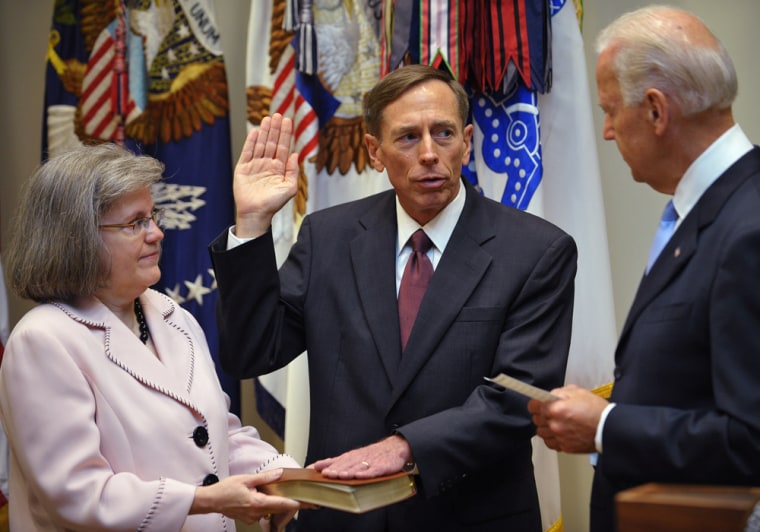Former Gen. David Petraeus has resigned as director of the CIA, the agency charged with keeping the nation’s secrets, and finding out the secrets of other countries, revealing that he had a secret of his own: He had an extramarital affair.
While cheating on a spouse may not wreck the average person’s job, sensitive parts of the federal government regard it as dangerous. The State Department and the National Security Agency have warned staffers that extra-marital dalliances can lead to disciplinary action. Both cite the potential for blackmail and information leaks. In the U.S. military, cheating is a crime.
That’s likely why Petraeus, who has been married for 37 years, made an announcement, confessed and resigned. "Such behavior is unacceptable, both as a husband and as the leader of an organization such as ours," he wrote in a letter released to the CIA work force Friday afternoon, NBC News first reported.
While Petraeus' situation is unique, given the nature of his job, what about the rest of us? While we likely wouldn't be compelled to reveal an affair in such a public way, should it be confessed at all? If so, to whom, and when?
University of Denver psychology professor Howard Markman, author of the book “Fighting for Your Marriage,” told NBC News that most affairs aren’t confessed, they’re discovered.
“A person doesn’t have an affair and then call the wife and say ‘Oh, by the way, hun, I just had an affair,’” he said. Instead, a spouse finds out somehow and then the couple has to make a decision about whether they want their relationship to continue.
If it’s not discovered, the cheating partner has to make that decision on his or her own. In that case, one has to think about the episode in the context of the marriage, Markman says. Do you want the marriage to survive or not?
While stressing that he doesn’t “tell people what to do,” Markman explained that “I feel if you really want to save your marriage, to work on it, it’s not great to have this thing hanging over your head. That’s not a recipe for lifetime happiness moving forward.”
Palo Alto, Calif., therapist Marty Klein, author of the book “Sexual Intelligence,” agrees that whether to confess or not depends on the couple and the person who’s considering the confession.
Different relationships have different dynamics. Some couples, of course, have a kind of don’t-ask-don’t-tell agreement – spoken or unspoken – about such things. Others may have firm ground rules that an affair will automatically trigger a divorce.
To tell or not can also depend on motivation. “For some people [confessing] is an urgent request for reconciliation, a loving act,” Klein said. “For others, it’s irresponsible, an unnecessary blow to the relationship.”
Breaking a promise, and then living with the guilt, may be the price somebody has to pay for transgressing, Klein explained. Telling, in some cases, could be a selfish way of avoiding this, comforting oneself rather than a contributing to the relationship’s future. He or she could be foisting guilt and trouble onto the spouse.
Whatever the circumstances, guilt, and worry about future discovery, are difficult things to adjust to. They can erode a relationship one is trying to save.
That’s why, Markman said, “if a person says ‘I want this to work, I really made a big mistake, how do I move forward?’ I talk to them and ask ‘Are you really capable of living a lie?’”
To help make that determination, he would encourage the person to think through the affair and the decision to admit it and to discuss it, but not necessarily with the spouse, at first. Sometimes, confessing to a trusted friend or a counselor can help. If somebody came to him, Markman said “I would advise this person to be thoughtful and basically own up that they made a bad decision.”
Brian Alexander (www.BrianRAlexander.com) is co-author, with LarryYoung Ph.D., of "The Chemistry Between Us: Love, Sex and the Science of Attraction," (www.TheChemistryBetweenUs.com), now on sale.
Related stories:
CIA Director David Petraeus resigns, cites extramarital affair
